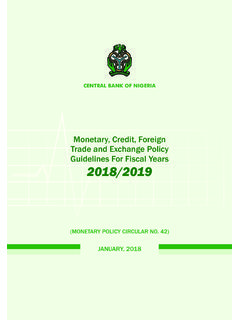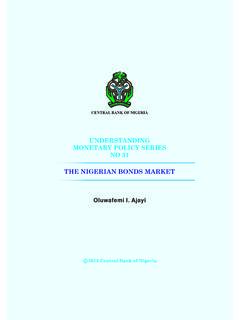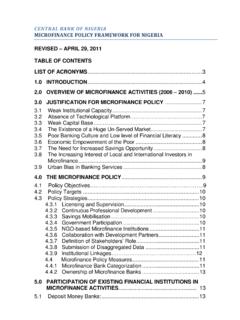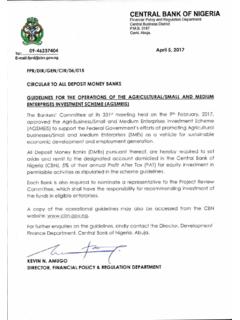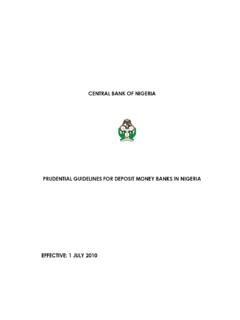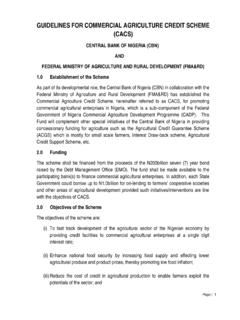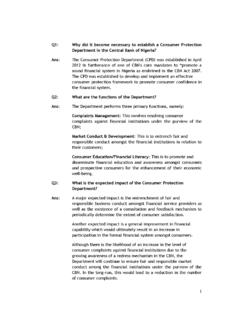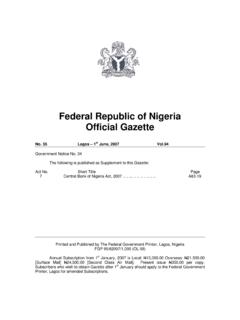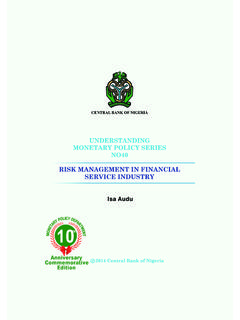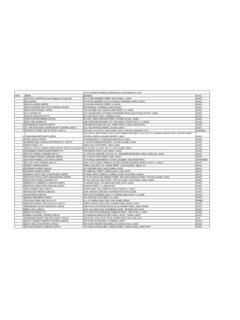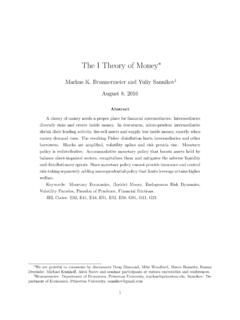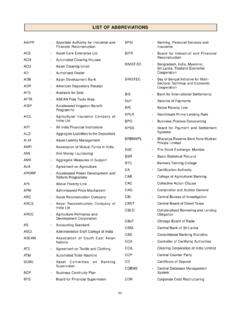Transcription of MONETARY POLICY - Central Bank of Nigeria
1 MONETARY POLICYCENTRAL bank OF NIGERIAEDUCATION IN ECONOMICS SERIESNO. 2 RESEARCH Definition of Money Supply Measures of Money for Money MONETARY Goals, Targets And Instruments Of MONETARY POLICY Rate Gross Domestic Product (NGDP) Rate Targeting. level targeting MONETARY POLICY Transmission Transmission Mechanism of MONETARY Rate Rate Price Credit bank lending Balance Sheet POLICY Implementation In MONETARY POLICY Strategies in Nigeria Instruments of MONETARY POLICY in Nigeria16 Institutional Framework For MONETARY POLICY In Institutional Framework for MONETARY POLICY in Issues In MONETARY POLICY and Economic POLICY and POLICY and Government POLICY MONETARY POLICY and to MONETARY POLICY in Nigeria25 References27 List of Tables Table 1.
2 MONETARY POLICY Instruments, Target and Goals6 List of FiguresFigure 1: MONETARY POLICY Strategies in Nigeria 16 Figure 2: MONETARY POLICY : Instruments and Targets 17 Figure 3: MONETARY POLICY Institutional Framework FrameworkIn this series, we look at MONETARY POLICY : its nature, formulation, and implementation in Nigeria . We begin with conceptual framework in Section Two, where money, money supply, demand for money and MONETARY POLICY are defined. In Section Three, we explain the objectives and instruments of MONETARY POLICY . This is followed by strategies of MONETARY POLICY in Section Four, MONETARY POLICY transmission mechanism in Section Five, and MONETARY POLICY implementation in Nigeria , in Section Six.
3 The Institutional framework for the implementation of MONETARY POLICY in Nigeria is discussed in Section Seven, while Section Eight focuses on other issues in MONETARY POLICY households may therefore reconsider their savings and investment plans with possible effects on the demand for goods and is simply anything of value that is accepted by the general public for the purpose of making transaction and settlement of debts. Money is used primarily as a means of exchange and plays an important role in the settlement of financial most cases, money is regarded as currency (notes and coins) because it is easily used in making payments.
4 That is why people use the term money and currency as meaning the same thing. However, money is more than currency in that it includes other things that are used for transactions. For example, in ancient civilization, cowries served as medium of exchange. Today, quite a number of countries have their own currency or money in the form of coins and paper notes, which is widely accepted in exchange for goods and services, as well as for debt settlement. The main reason currencies are Definition of MoneyContributors to this series are: Oko Mbutor; Chioma P. Nwosu; Oladunni Adesanya and Kamaldeen Ajala11generally accepted is because their issuance is backed by law.
5 In Nigeria , the national currency (naira and kobo) is issued by the Central bank of Nigeria (CBN) and it is the legal tender for the settlement of financial can also be used for other purposes beyond the settlement of financial obligations or as a medium of exchange. It can serve as a unit of account and hence can be used in determining the value of goods and services. Money also acts as a standard for measure of value for goods and services. Besides these functions, money also acts as a standard of deferred payments and store of supply is the sum of all money or MONETARY assets that can easily be converted to cash in an economy at a specific time.
6 It is often referred to as money stock since it is measured at a particular point in time. Money supply is closely monitored by the MONETARY authorities the Central banks because if the rate of increase in money supply is consistently greater than the rate of increase in total output of goods and services in the economy, there could be a general increase in the domestic prices of goods and services: a situation generally referred to as supply is measured differently by countries depending on how developed the financial system is. In Nigeria , the different measures of money supply known as MONETARY aggregates include; MONETARY base, narrow money and broad money.
7 The MONETARY base, also known as the base money, high-powered money or reserve money, is the sum of currency outside banks, currency in the vault of deposit money banks (DMBs) and the cash reserves of DMBs with the Central bank (R). The sum of currency outside banks and currency in vault of DMBs is called currency in circulation (C). The MONETARY base is the most liquid Money Supply Measures of Money Supply2measure of money supply and the lowest classification of money, often denoted as M. Symbolically, the MONETARY base is expressed as 0M = R + example, suppose Nigeria has N500 million circulating in the public and N10 billion as part of deposits from DMBs in the Central bank .
8 In this case, the MONETARY base for Nigeria is billion. The MONETARY base can be controlled by the MONETARY POLICY actions of the Central bank . This is because some of its components ( bank reserves) are directly under the Central bank 's control. The measure of money supply is very important in MONETARY management. This is because Central banks control money supply through the measure of money. Narrow money (M) is another measure of money and is made up of all 1currencies in circulation (C) and demand deposits (DD) belonging to different households and businesses with DMBs. Put differently, M1 is the sum of all paper notes and coins in circulation and balances in current accounts used for effecting payments.
9 It is expressed as: M = C + money (M2) is the broader measure of money supply and it consists of the components of narrow money, time deposits (TD), and savings deposits (SD) with DMBs. In terms of symbols, broad money can be written thus: M = C + DD + TD + SD 2Or M = M + TD + SD. 21 Savings and time deposits are also called near or quasi- money. In other economies, money supply goes beyond the M. For instance, in the 2 United States of America, there is M, which includes M plus large time 323deposits, large denomination term repurchase agreements, shares in money market, mutual funds owned by institutional investors and some Eurodollar demand for money is the desired holding of money by people or the amount of money people would like to hold at a particular point in time.
10 The money can be held as cash or bank deposits. The reason people desire to hold money differs. Some people may need to hold money to settle their financial commitments (transactions demand) while some may hold money to meet unexpected events (precautionary demand). There are those who may hold money in order to take advantage of expected future changes in prices (speculative demand). MONETARY POLICY refers to any conscious or deliberate actions of the MONETARY authorities, mostly Central banks, to control (change) the quantity, availability or cost of money in an economy in order to achieve laid down goals/ objectives.
